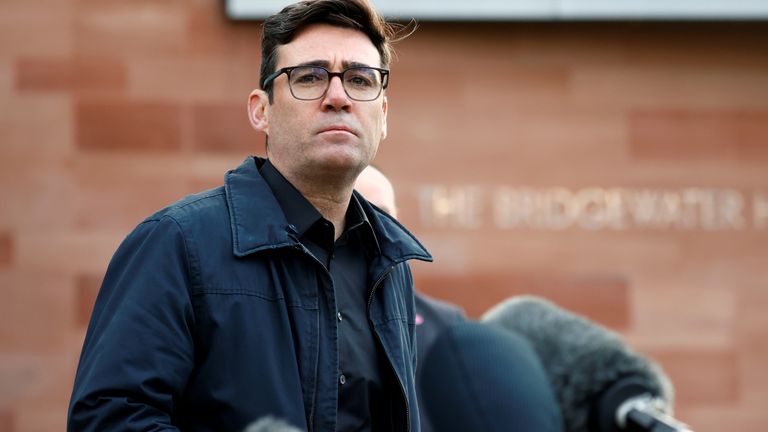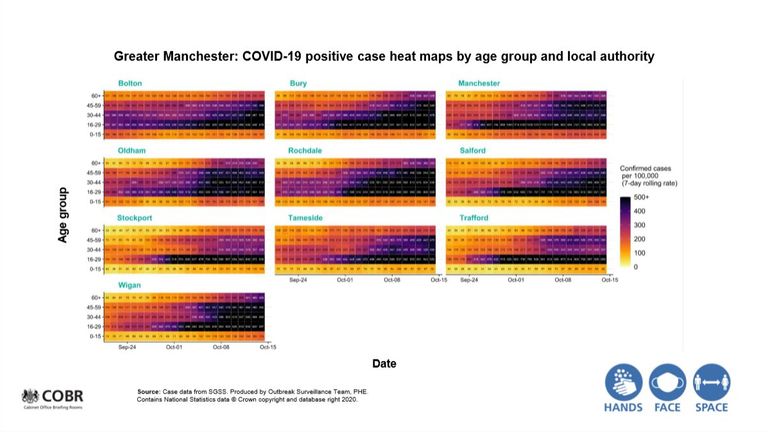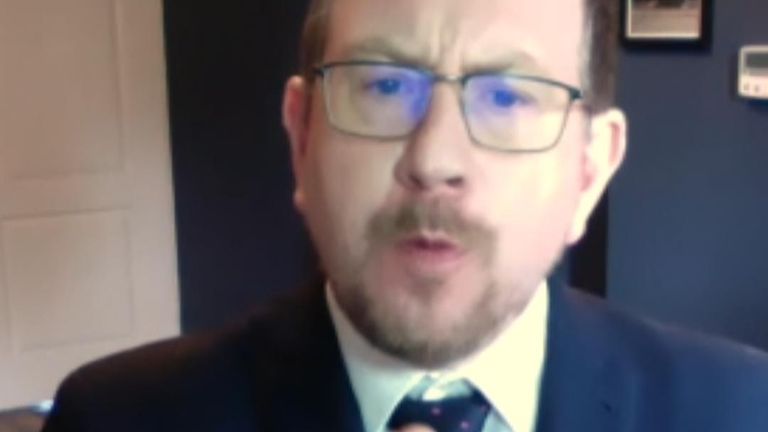Greater Manchester will enter Tier 3 coronavirus restrictions from Friday, Boris Johnson has confirmed.
The prime minister announced the move to tougher COVID-19 measures – the top alert level, called “very high” – after talks with local leaders ended without a deal.
The imposition of extra restrictions comes amid a bitter row with politicians in the area over extra support to accompany the move into Tier 3.
Greater Manchester mayor Andy Burnham accused the government of “walking away” from the discussions during an impassioned news conference earlier.
He said local leaders were not offered enough support to protect people through the “punishing” winter ahead.
Addressing a Downing Street briefing, Mr Johnson said a “comprehensive package of support” was in place for areas put into Tier 3 restrictions, including the government’s Job Support Scheme and access to Universal Credit.
The PM said Greater Manchester would get £22m to implement and enforce the new measures, far short of the £90m local leaders had been calling for.
Mr Johnson added that in addition to this support, a “generous and extensive offer to support Manchester’s businesses” was put on the table, understood to be £60m.
“This offer was proportionate to the support we have given Merseyside and Lancashire [the other areas in Tier 3], but the mayor didn’t accept this unfortunately,” the PM said.
Downing Street later confirmed that the offer of £60m is still on the table.
The Liverpool City Region received £44m as it moved into Tier 3, while Lancashire got £42m.
Justifying imposing the restrictions, Mr Johnson said that failing to act “would put Manchester’s NHS, and the lives of many of Manchester’s residents, at risk”, Mr Johnson said.
The PM added: “Despite the failure to reach an agreement, I hope the mayor and council leaders in Greater Manchester will now work with us to implement these measures.”
And he said that talks with local leaders in South Yorkshire, West Yorkshire, Nottinghamshire and the North East about moving their areas into Tier 3 were continuing.
Moving into Tier 3 means pubs and bars in Greater Manchester will be closed, unless they serve substantial meals, while betting shops, casinos, bingo halls, adult gaming centres and soft play areas will also shut.
Different households will also be banned from mixing indoors and outdoors, including in private gardens.
Mr Burnham said politicians in Greater Manchester had originally wanted £90m – £15m a month until the end of the financial year, arguing that the current level of government support is not enough for workers affected by business closures.
He said civic leaders were prepared to reduce their demand for financial support to £65m, the “bare minimum to prevent a winter of real hardship”, but ministers would only offer £60m.
“That is what we believe we needed to prevent poverty, to prevent hardship, to prevent homelessness,” Mr Burnham said.
“Those were the figures that we had – not what we wanted – but what we needed to prevent all of those things from happening.
“But the government refused to accept this and at 2pm today they walked away from negotiations.”
“At no point today were we offered enough to protect the poorest people in our communities through the punishing reality of the winter to come,” Mr Burnham added.
The mayor said he remained willing to strike a deal with Downing Street, “but it cannot be on the terms that the government offered today”.
And he called for MPs in parliament to agree a framework for other areas which will face the prospect of moving into Tier 3 in the future, in order to avoid the recriminations and wrangling seen in Greater Manchester.
Conservative MP Chris Green, who represents Bolton West, said he was “disappointed” that the area will be under tougher measures and “I don’t believe the science supports this action”.
He added: “I think the health and economic impact will be damaging to our community but we have to do all we can to respect these rules since they have been imposed.”



